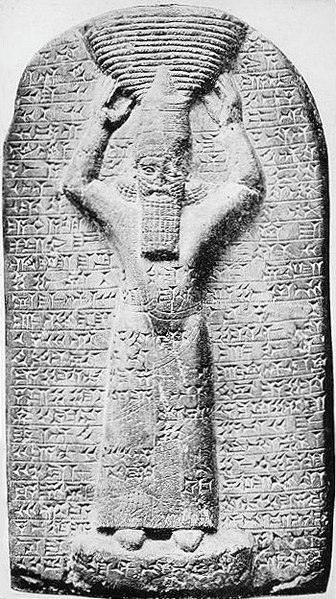
It is believed that it was due to the Assyrian invasions that the Israelites were uprooted from their own land, the land of Israel and had to emigrate across the world. These immigrants formed the Jewish diaspora.
Restless, the rulers of the kingdom of Judah in the south watched on as these events unfolded in the ‘kingdom of Israel’. Though they were safe till then they were certain that the same fate lay in store for them; it was just a matter of time. Sure enough the time came but a good hundred and twenty years later. The danger was imminent. So, in order to defer it as much as possible and to prolong the period of safety, the rulers of the kingdom of Judah paid a hefty sum annually to the Assyrian king.
The 8th century BC had given way to the 7th century BC. Having gulped the ‘kingdom of Israel’, the Assyrian regime had now strengthened its grip over it, but not everything was well in all parts of their kingdom. The kingdom of Babylonia, which was one of the many kingdoms that they had captured one after the other, had begun to revolt against the cruel Assyrian rule.
It was now more than two hundred years since the Assyrians were ruling over Babylonia. About one thousand five hundred years prior to this, Babylonia was considered the centre of culture of Mesopotamia, a region that was situated between the rivers Tigris and Euphrates (now in Iraq). It was during this period that they had reached the peak of wealth and prosperity.
Babylonia was now simmering with bitter discontent. But their revolt did not see any success till the time Ashurbanipal, the last powerful Neo-Assyrian king was reigning. But the kings who followed Ashurbanipal after his death in 627 BC were weak and stayed in power for very short periods of time. Their times saw not only the internal power struggles but also provincial rivalry forcing the pace.
The Babylonians saw an opportunity in this and organized an uprising against the Assyrians. Under the leadership of ‘Nabopolassar’ battles were fought at a number of places. The Babylonians then won a prolonged, bloody war and won back the majority of the land under the Assyrian control. Finally, the Assyrian capital of Nineveh (modern-day region adjoining the Iraqi city of Mosul) fell to the Babylonians which marked the complete defeat of the Assyrian. The event is said to have happened in the year 612 BC.
Owing to the victory of the Babylonians (Neo-Babylonian) over the Assyrians, the ‘kingdom of Israel’ already under the sway of the latter, became part of the Babylonian kingdom. ‘Nabopolassar’, the ruler of all these regions, now began eyeing the ‘Kingdom of Judah’, originally a part of the kingdom of Israel.
However, before he could invade the Kingdom of Judah, Nabopolassar died in 605 BC. His son Nebuchadnezzar II succeeded him and within a year of taking over the reigns of the kingdom, launched an attack on the kingdom of Judah. The rulers of the kingdom of Judah, who had been paying the Assyrians in order that they refrain from invasion, now agreed to pay the Babylonians for the same reason. As a result the kingdom of Judah was assured of safety, at least for the moment.
Within a few years however, the Pharaoh of Egypt extending a hand of friendship, incited the rulers of Judah to stop paying the hefty sums that they had been paying all along. Consequently the period between 597 BC and 582 BC witnessed frequent invasions by Nebuchadnezzar. The first of these was marked by the death of the ruler Jehoiakim of Judah and resulted in Jeconiah, his son, being crowned king at the age of eighteen.
After laying siege to Jerusalem for three months, the army of Nebuchadnezzar barged into the city and began plundering the place. They did not spare the ‘Holy Temple’ either and robbed it of several valuables. Besides, Jeconiah and his courtiers as also the respectable, the wealthy, the cream of the intelligentsia were arrested and taken to Babylon (a region in present day Iraq). Nebuchadnezzar appointed Jeconiah’s uncle (Jehoikaim’s brother) Zedekiah, as king of Judah. The Israelites who were arrested and transported to Babylon and their descendants never accepted Zedekiah as their king. For them it was always Jeconiah.
Although the army of Judah faced several invasions over those 15-16 years, their kingdom ceded one region after another to Babylon.
The court of Judah too stood divided into two over the issue of paying the Babylonian rulers. One group was against paying any money at all and the other group was of the opinion that money be paid but only to buy time to build adequate strength to face the Babylonians. For otherwise they would be inviting doom. It so happened however, that Zedekiah slowly gave in to the group that was against payment of money.
The Egyptians were looking for an opportunity to take revenge on the Babylonians. They began to instigate Zedekiah who eventually relented and entering into a treaty of friendship with the Egyptians, Zedekiah stopped payment to the Babylonians.
This resulted in an enraged Nebuchadnezzar launching an attack on Judah in 589 BC. The Egyptians were first made to bite the dust after which Nebuchadnezzar turned his attention to Jerusalem.
Jerusalem withstood a siege of about eighteen months after which it gave in to the invaders. In 587 BC the capital city of the kingdom of Judah fell to the enemy. The Babylonians rammed through the strong fortifications and took to plunder. They even set fire in places. They are believed to have taken the lives of more than nine hundred thousand Jews. King Zedekiah attempted to flee through a secret tunnel but was caught by Nebuchadnezzar’s soldiers and was brought before the king where he had to witness the death of his sons and other dear ones. His eyes then gouged out, Zedekiah was arrested and taken to Babylon.
But worse was yet to come….(To be continued…)














